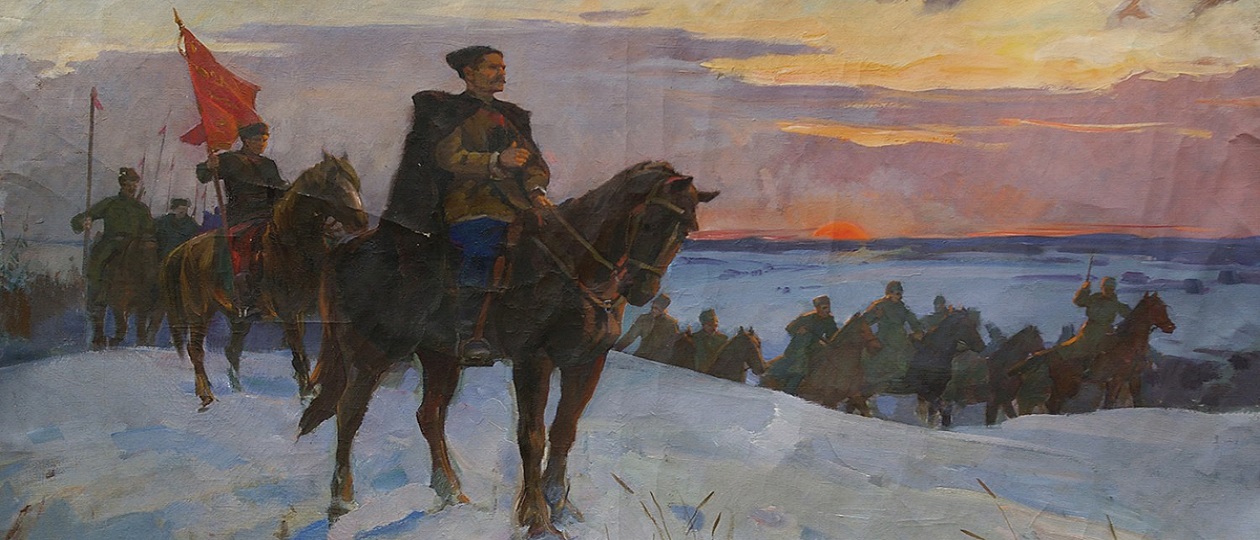
On September 5, 1919, Vasily Ivanovich Chapayev, a Red Army commander and participant in the First World War and the Civil War, was killed.
He was awarded three St. George’s Crosses and one medal in the First World War. He was also awarded the Order of the Red Banner (1919).
Chapayev was killed as a result of a deep Cossack raid (about 300 sabres, according to another version, 3 cavalry regiments) that led to a surprise attack on the well-guarded (about 1,000 bayonets) town of Lbischensk (now the village of Chapayev in the West Kazakhstan region of Kazakhstan), located deep in the rear, where the headquarters of the 25th division was located. Colonel Sladkov’s detachment managed to approach Lbischensk unnoticed along the Kushum River bed, having taken refuge in the reeds of the Kuzda-Gora tract the day before the attack.
On the eve of the attack, Chapaev’s headquarters received information about encountered Cossack patrols, but they were not given much importance, since this was a common occurrence. The pilots attached to the 25th division were also unable to identify such a large detachment, which later allowed a number of authors to accuse them of possible treason. At 3 a.m. on September 5, Borodin’s military group began moving toward Lbischensk from the west and north, and Sladkov’s group from the south.
Among the Cossacks were many natives of Lbischensk, who knew the city itself and the area around it very well. The attack was successful, most of the Red Army soldiers surrendered without a fight, and individual pockets of resistance were quickly suppressed. The Cossacks were actively assisted by the local population — for example, the commissar of the division Baturin, who tried to hide in the stove, was given away by the owner of the house.
The captured Red Army soldiers were led through the streets in the morning, and if the locals pointed to someone as a participant in the robberies or a member of a special forces unit, then immediate reprisals followed. In total, about one and a half thousand people were killed in Lbischensk, about 800 Red Army soldiers were captured. According to the recollections of the raid participants, a special platoon under the command of Belonozhkin was assigned to capture Chapaev.
Belonozhkin, led by a captured Red Army soldier, attacked the house where Chapaev was quartered, but missed him: the Cossacks pounced on the Red Army soldier who appeared from the house, mistaking him for Chapaev himself, while Chapaev jumped out the window and managed to escape. During his escape, he was wounded in the arm by a shot from Belonozhkin. Having stopped the Red Army soldiers who were running to the river in panic, Chapaev gathered a detachment of about a hundred men with a machine gun and was able to organize resistance.
There are many conflicting versions of the circumstances of his death. The Cossacks were promised a reward for the dead Chapaev, but none of them could confirm his death or present his body after the battle.
According to some sources, during the battle Chapaev was wounded in the stomach and two Hungarian Red Army soldiers put the wounded Chapaev on a raft made from half a gate and ferried him across the Ural. But on the other bank it turned out that Chapaev had died of blood loss. The Hungarians buried his body with their hands in the coastal sand and covered it with reeds so that the Cossacks would not find the grave. The bed of the Ural River has changed several times over the past decades and it is no longer possible to determine the place where Chapaev was supposedly buried.
The name of Vasily Chapaev became widely known and popular in the Soviet Union after the publication of the novel “Chapaev” in 1923 by Dmitry Furmanov, who served for a spell as a commissar in his division, and the film of the same name by the Vasiliev brothers in 1934. As a result of the nationwide popularity of the heroes of the book and film, the name Chapaev was given to many settlements, streets, military and civilian ships, and during the Great Patriotic War, partisan detachments bore the name Chapaev.
Despite the fact that in the works of modern historians and publicists Chapaev’s role in the Civil War was recognized as exaggerated, he continues to be one of the most famous Red commanders of that era, the hero of films, television series and books, including those of such writers as Viktor Pelevin, Zakhar Prilepin and Eduard Volodarsky. Countless jokes about Chapayev and the heroes from the film were and remain very popular in the former Soviet Union in the post-Soviet years.





